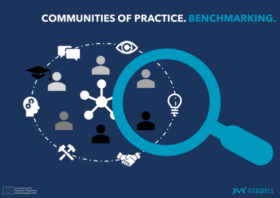What is Benchmarking?
Benchmarking – in our perspective – is a systematic learning process by comparing your community of practice as regards its setup, processes, or practices against other communities of practice. The aim is to learn from each other by identifying reference points and areas for improvement. It involves identifying, measuring and evaluating indicators to understand how your community of practice is establihsed or performing compared to its peers.
What is our Benchmarking Tool?
Our Benchmarking Tool supports change agents and change mentors who facilitate and support local communities of practice to become better aware of certain local COP developments and processes, and to benchmark against other local COP. Our focus is on local COP in the field of health and well-being. The tool has been developed with the support from the European Union through the SUSWELL Capacity Building Initiative. SUSWELL established local communities of practice in Kosovo and Russia to build capacity through social innovation. We aimed to improve and sustain health and well-being at community level in Pristina, Gjakova, Perm, St. Petersburg and Belgorod. Yet, the initiative developed tools and materials open and useful for communities of practice beyond these municipalities and regions, and beyond the scope of health and well-being.
What types of Benchmarking do we Support?
A. BENCHMARKING ENGAGEMENT: Local communities of practice (COP) for health and well-being are groups of individuals who share a common interest in promoting the health and well-being in local communities. They are driven and characterized by the fact that local COP members engage to continuously learn, to share knowledge, to network, and to exchange experiences and best practices. The engagement of those diverse individuals is crucial for the success of a local COP. Benchmarking engagement in local COP involves assessing the level of participation, interaction, and collaboration.
B. BENCHMARKING SOCIAL IMPACT: Social Impact through communities of practice – in our perspective – refers to the effect or influence that an action, program, project, or initiative facilitates through a local community of practice has on the health and well-being or quality of life in local communities. It involves the measurable but also broader consequences of a particular activity on social issues, with the goal of creating positive and sustainable change towards a healthier society. Benchmarking social impact through local communities of practice involves assessing and comparing the effectiveness of social innovation initiatives in achieving positive and sustainable changes in the local community.
Where can I find more Learning Resources?
In the framework of our European Suswell Capacity Building initiative, we have developed a set of learning resources for change agents and change mentors facilitating local communities of practice in the field of health and well-being. In addition, we have developed four CPD courses about Digital Health Literacy, Futures Literacy, Interprofessional Work, and Transition Leadership, which all support the work of change agents and change mentors in the field. We have also partnered with the Social Innovation Learning Space Yanuz with which we have synchronized various facilitation and evaluation approaches and instruments. Through Yanuz, the sharing of experience and knowledge is accelerated inside and between local communities of practice.
